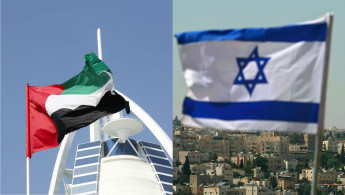US hosts 'secret anti-Iran meetings' between UAE, Israel
The United States has arranged secret meetings between top Israeli and Emirati officials to discuss checking Iran in the region, The Wall Street Journal reported on Thursday.
The State Department's representative for Iran convened meetings in the spring and another more recently, the report said.
Israel has diplomatic relations with only two Arab countries - Egypt and Jordan - but common concerns over Iran have brought it closer to Gulf nations in recent years.
Israel's foreign minister this month met with a "high ranking persona" from the United Arab Emirates to improve ties between Israel and Arab states.
Israel Katz said that the two reached "substantial agreements," adding that he was working toward "transparent normalisation and signed agreements" with Gulf states.
Prime Minister Binyamin Netanyahu has often boasted of improving ties with Arab states that share Israel's concerns about Iran.
Katz visited the UAE for a UN conference earlier this year.
The Israeli Foreign Ministry said he met with a senior UAE official there. Netanyahu visited Oman last year.
Read more: Saudi-Israeli relations: The emergence of a new alliance
Israel's occupation of Palestine is still widely seen as an obstacle to publicly improving ties with Arab states.
But for the kingdom and its allies in the Gulf, Israel's shared enmity with Iran may trump the powerful and popular anger over an Arab state normalising ties with Israel.
Formalising such an alliance, however, could be hard to achieve.
Last month, reports said Saudi Arabia has been in conversations with Israel to buy natural gas, according to Kara, an ally of Israeli Prime Minister Binyamin Netanyahu.
The discussions mark the latest sign of warming relations between the two nations, which do no share diplomatic ties.
Saudi Arabia and Israel have discussed building a gas pipeline to link the kingdom to the Israeli Red Sea port city of Eilat, former Netanyahu cabinet member Kara told Bloomberg citing senior officials in the region.
The discussions also include linking Saudi Arabia to the Eilat-Ashkelon pipeline in Israel, allowing the kingdom to export its oil to Europe and other markets while avoiding the Strait of Hormuz, where Saudi Arabia and the US have accused Iran of carrying out attacks on oil tankers.
Such a project could result in a substantial political blowback across the region.
A controversial but lucrative natural gas deal between Jordan and Israel - which have had diplomatic relations since the 90s - was subject to years of mass protest, with critics claiming the kingdom buying the "enemy's gas" amounted to "occupation".
While dissent is infamously hard to vocalise in Saudi Arabia, normalisation with Israel could prove incredibly unpopular.
Resistance against the idea led more than 2,000 citizens from various Gulf countries to sign a petition "to stop all forms of normalisation with the Zionist entity".





 Follow the Middle East's top stories in English at The New Arab on Google News
Follow the Middle East's top stories in English at The New Arab on Google News
![Netanyahu furiously denounced the ICC [Getty]](/sites/default/files/styles/image_330x185/public/2024-11/GettyImages-2169352575.jpg?h=199d8c1f&itok=-vRiruf5)
![Both Hamas and the Palestinian Authority welcomed the ICC arrest warrants [Getty]](/sites/default/files/styles/image_330x185/public/2024-11/GettyImages-2178351173.jpg?h=199d8c1f&itok=TV858iVg)
